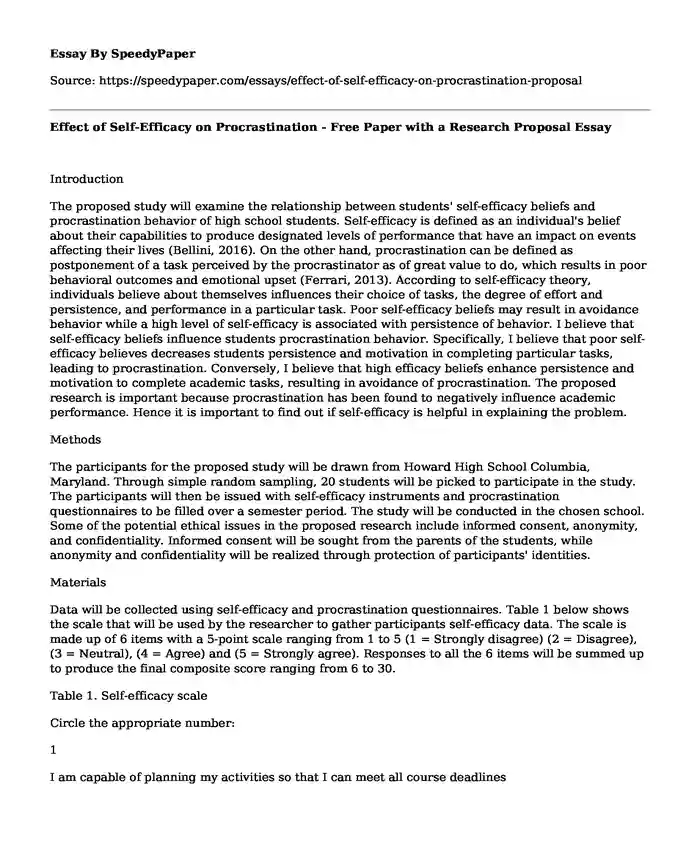
| Type of paper: | Essay |
| Categories: | Students Research Time management Productivity |
| Pages: | 3 |
| Wordcount: | 736 words |
Introduction
The proposed study will examine the relationship between students' self-efficacy beliefs and procrastination behavior of high school students. Self-efficacy is defined as an individual's belief about their capabilities to produce designated levels of performance that have an impact on events affecting their lives (Bellini, 2016). On the other hand, procrastination can be defined as postponement of a task perceived by the procrastinator as of great value to do, which results in poor behavioral outcomes and emotional upset (Ferrari, 2013). According to self-efficacy theory, individuals believe about themselves influences their choice of tasks, the degree of effort and persistence, and performance in a particular task. Poor self-efficacy beliefs may result in avoidance behavior while a high level of self-efficacy is associated with persistence of behavior. I believe that self-efficacy beliefs influence students procrastination behavior. Specifically, I believe that poor self-efficacy believes decreases students persistence and motivation in completing particular tasks, leading to procrastination. Conversely, I believe that high efficacy beliefs enhance persistence and motivation to complete academic tasks, resulting in avoidance of procrastination. The proposed research is important because procrastination has been found to negatively influence academic performance. Hence it is important to find out if self-efficacy is helpful in explaining the problem.
Methods
The participants for the proposed study will be drawn from Howard High School Columbia, Maryland. Through simple random sampling, 20 students will be picked to participate in the study. The participants will then be issued with self-efficacy instruments and procrastination questionnaires to be filled over a semester period. The study will be conducted in the chosen school. Some of the potential ethical issues in the proposed research include informed consent, anonymity, and confidentiality. Informed consent will be sought from the parents of the students, while anonymity and confidentiality will be realized through protection of participants' identities.
Materials
Data will be collected using self-efficacy and procrastination questionnaires. Table 1 below shows the scale that will be used by the researcher to gather participants self-efficacy data. The scale is made up of 6 items with a 5-point scale ranging from 1 to 5 (1 = Strongly disagree) (2 = Disagree), (3 = Neutral), (4 = Agree) and (5 = Strongly agree). Responses to all the 6 items will be summed up to produce the final composite score ranging from 6 to 30.
Table 1. Self-efficacy scale
Circle the appropriate number:
1
I am capable of planning my activities so that I can meet all course deadlines
1--2--3--4--5
2
I am capable of organizing my activities so that I can meet most course deadlines.
1--2--3--4--5
3
I am capable of solving most academic problems if I invest the necessary effort.
1--2--3--4--5
4
I usually handle anything that comes my way.
1--2--3--4--5
5
I find it easy to stick to my objectives and accomplish short-term academic goals.
1--2--3--4--5
6
I can grasp all of the key concepts taught in class
1--2--3--4--5
Table 2 below shows the scale that will be used by the researcher to gather participants procrastination data. The scale is made up of 10 items with a 5-point scale ranging from 1 to 5 (1 = Strongly disagree) (2 = Disagree), (3 = Neutral), (4 = Agree) and (5 = Strongly agree). Responses to all the items will be summed up to produce the final composite score ranging from 10 to 100.
Table 2. Procrastination Scale
Circle the appropriate number:
1
I always have to hurry to finish a task on time.
1--2--3--4--5
2
In preparing for deadline, I usually waste time by concentrating on other things.
1--2--3--4--5
3
I usually complete a task sooner than necessary.
1--2--3--4--5
4
I usually find myself doing tasks that I had planned to do several days before.
1--2--3--4--5
5
I always do not do tasks until just before they are to be handed in.
1--2--3--4--5
6
I am regularly saying I will complete it tomorrow.
1--2--3--4--5
7
I regularly complete all the tasks I plan to do in a day.
1--2--3--4--5
8
I begin doing an assignment just after being assigned.
1--2--3--4--5
9
I usually finish earlier than the given deadline.
1--2--3--4--5
10
I usually delay before beginning to do what I have to do.
1--2--3--4--5
References
Bellini, S. (2016). Building social relationships 2: a systematic approach to teaching social interaction skills to children and adolescents on the autism spectrum. Lenexa, KS: AAPC Publishing.
Ferrari, J. R. (2013). Procrastination and task avoidance: theory, research, and treatment. Place of publication not identified: Springer-Verlag New York.
Cite this page
Effect of Self-Efficacy on Procrastination - Free Paper with a Research Proposal. (2017, Aug 09). Retrieved from https://speedypaper.com/essays/effect-of-self-efficacy-on-procrastination-proposal
Request Removal
If you are the original author of this essay and no longer wish to have it published on the SpeedyPaper website, please click below to request its removal:
- Clinical Trials Going Global - Essay Example
- Free Essay on the Role of Modern Technology in Communication Efficiency
- Free Essay on Personal Business Plan
- Free Essay: Case of Anna O and the Development of Psychoanalysis
- Essay Sample: Ethical Dilemma in Nursing Care
- Jeffersonian Worldview - Free Essay Sample for Students
- Navigating Workplace Conflict: Strategies and Styles - Free Essay Example
Popular categories




